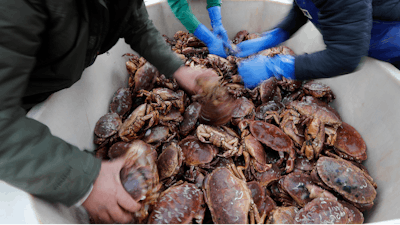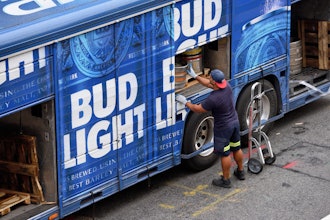
LONDON (AP) — British fishing communities were among the strongest supporters of Brexit. But now some say they face ruin because of new red tape imposed by the U.K.'s departure from the European Union.
One seafood firm has threatened to dump rotting crustaceans on the government’s doorstep if the situation doesn't improve within days.
The government insisted Thursday that the issues were just “teething problems” that would soon be solved.
Many British fishermen backed Brexit because it promised the chance for the U.K. to leave the EU’s complex system of fishing quotas and regain control over who is allowed to fish in British waters.
Fishing rights became a major sticking point in the trade negotiations that followed the U.K.’s political departure from the bloc in January 2020, as European nations sought to retain access to waters where they have fished for decades or centuries.
Under a new U.K.-EU trade deal agreed last month, the EU’s share of the catch in British seas will be cut by 25% over a 5 ½-year transition period. After that, new quotas will have to be negotiated.
At the same time, Britain’s exit from the EU single market means new costs and red tape for exporters -- a major problem since Britain exports most of the fish its boats catch.
Danish company DFDS, which transports seafood from Scotland to the EU by truck, has suspended shipments at least until Monday because of delays in getting new paperwork in order.
Jamie McMillan of Scotland’s Lochfyne Langoustines said “the fishing industry has been made a fool of” by the government in London.
“We can’t get our product to the EU market because of red tape,” he said in a video released on social media.
“If Scottish exporters can’t get their product to market next week, we will be at the gates of Westminster and we’ll be dumping our shellfish on your doorstep, rotten,” he added.
The trade deal that took effect Jan. 1 allows Britain and the EU to trade in goods without quotas or tariffs. But that is a far cry from the seamless, hassle-free trade the U.K. enjoyed while it was part of the EU’s single market. Companies face new expense and red tape, including customs declarations and border checks. There have been shortages of some goods on supermarket shelves as firms reduce the number and amount of shipments they make.
Prime Minister Boris Johnson has said fishing companies will be compensated for their losses, though he has not given details.
Environment, Food and Rural Affairs Secretary George Eustice said the hiccups were “only teething problems. Once people get used to using the paperwork, goods will flow normally.”
But many fishermen are unconvinced. Their anger grew after Fisheries Minister Victoria Prentis said Wednesday that she had not read all of the 1,200-page trade agreement when it was published on Christmas Eve, because she was busy “organizing the local Nativity trail.”
Liberal Democrat lawmaker Alistair Carmichael, who represents Scotland's Orkney and Shetland islands, said the problems were the government’s fault.
“For years this government has promised our fishing industry a sea of opportunity, but today our boats are tied up in harbor, their propellers filled with red tape manufactured in Whitehall,” he said Thursday in Parliament.






















